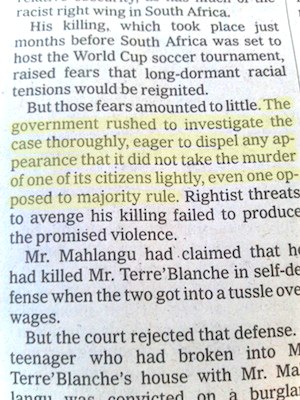Negation: a gamble comes out wrong
« previous post | next post »
Reader MD sent in another contribution to the misnegation archives — Lydia Polgreen, "A Murder Sentence Underlines South African Inequality", New York Times, 8/22/2012:
The death of Eugène Terre’Blanche, the leader of the militant white separatist group known as the Afrikaner Resistance Movement, seemed an ominous sign that the era of racial harmony that began in 1994 with the end of apartheid and the beginning of nonracial democracy was in peril. […]
The government rushed to investigate the case thoroughly, eager to dispel any notion that it took lightly the killing of one of its citizens, even one opposed to majority rule.
MD notes that "the international print edition must have been printed before an error was noticed. I read it a few times after my initial interpretation seemed wrong." The version that he read had this in place of the last sentence quoted above:
The government rushed to investigate the case thoroughly, eager to dispel any appearance that it did not take the murder of one of its citizens lightly, even one opposed to majority rule.
MD provided a snapshot:

Simplifying the problem (and the sentence) somewhat, the writer had three binary choices to make — the government was eager to:
| dispel any notion that | make it clear that |
| it did not take the murder | it took the murder |
| lightly | seriously |
This yields eight combinations, of which four (in bold face) have the right overall polarity, while four come out upside-down:
0 0 0: eager to dispel any notion that it did not take the murder lightly
0 0 1: eager to dispel any notion that it did not take the murder seriously
0 1 0: eager to dispel any notion that it took the murder lightly
0 1 1: eager to dispel any notion that it took the murder seriously
1 0 0: eager to make it clear that it did not take the murder lightly
1 0 1: eager to make it clear that it did not take the murder seriously
1 1 0: eager to make it clear that it took the murder lightly
1 1 1: eager to make it clear that it took the murder seriously
The original choice was essentially the one labelled 0 0 0, while the one online is now 0 1 0.
It would be a good exam question in a psychosemantics course (are there any?) to give a formal account of the differences in interpretation, and to explain why the alternative originally chosen was a likely mistake.
J.W. Brewer said,
September 19, 2012 @ 4:05 pm
This is a separate point, but the headline, while grammatical, does not seem to match the story. There is no real information about the sentence the defendant received, much less how the severity-or-leniency of that sentence "underlines inequality." Now if the post-apartheid South African court system seemed in practice to be sentencing blacks who killed whites more severely than whites who killed blacks (or vice versa), or employees who killed employers more severely than employers who killed employees (or vice versa), that would be an interesting story, and one that this headline would fit. But here I suppose the point is simply that the evidence at trial established that economic inequality, as opposed to race or politics, gave rise to the motive for the killing. This isn't a headline that conveys that point.